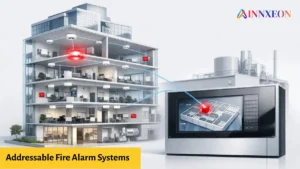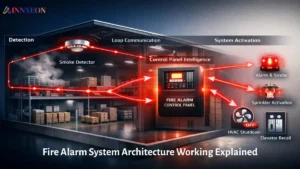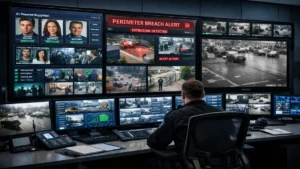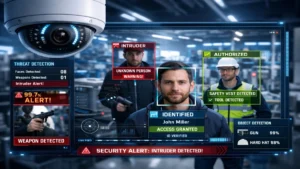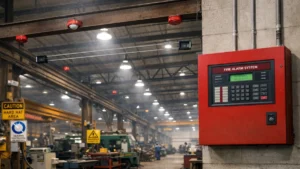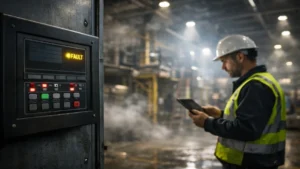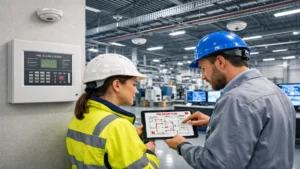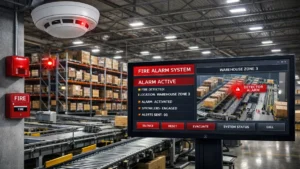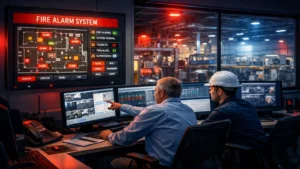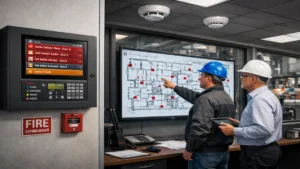In the SME (Small and Medium-Sized Enterprise) ecosystem, buying decisions rarely start with “What is the best product?”
They begin with “What will work without disrupting my business?”
Small factories, independent workshops, retail clusters, storage units, micro-industrial parks and compact office buildings do not evaluate fire alarm systems the same way airports, malls or IT campuses do. Their purchase drivers are simpler, sharper and highly practical:
- Will this system run daily without failing?
- Will my team actually understand how to use it?
- Will false alarms stop production?
- Will maintenance cost eat into my profits?
- Will the panel survive dust, electrical noise, heat and power fluctuations?
- And most importantly, will it solve my compliance requirement without becoming a new headache?
When a product answers all these questions confidently, adoption stops being a hurdle.
It becomes a natural choice.
That is exactly what happened with GST100 Fire Alarm Panel Series.
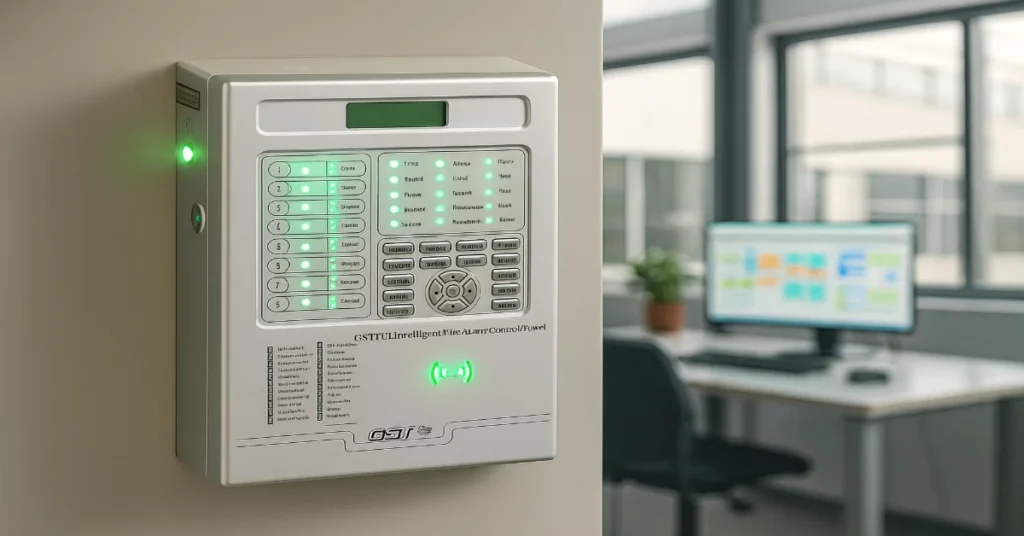
It did not become the highest-selling entry-level fire panel because of aggressive marketing or inflated spec sheets.
It grew because the SME sector quietly voted for it with repeat purchases, installations and recommendations.
The Real Market Gap That GST100 Filled
For years, SMEs faced only two realistic options in fire panels:
- Low-cost, low-reliability panels that solved budget constraints but failed in uptime, accuracy and durability.
- High-end smart panels that worked well but required deeper pockets, trained staff and complex maintenance cycles.
There was a missing third category:
A panel that is affordable like a basic system, but reliable like an advanced one.
SME owners did not need premium networking, remote analytics, BMS integrations, cloud dashboards or multi-loop intelligence.
They needed a system that detects fire accurately, raises an alarm correctly, runs every day without crashing and does not demand an expert to operate it.
GST100 placed itself exactly in this gap and the market responded instantly.
Understanding the Core Buying Psychology of SME Business Owners
Most SME decision makers include factory owners, safety supervisors, procurement managers, electricians or administrative heads who juggle 15 responsibilities at once. They value fire safety, but they also fear systems that:
- look complex,
- require frequent troubleshooting,
- need expensive proprietary spare parts,
- involve vendor lock-ins,
- or demand certified engineers for every small issue.
GST100 became their preferred choice because it reduces dependency on external support instead of increasing it. The system works intuitively, signals clearly and stays stable even when the electrical environment is not ideal.
The buyer mindset here is simple:
“I want peace of mind, not another project to manage.”
GST100 delivers exactly that.
Why the Market Trusted It So Quickly
One of the biggest reasons for GST100’s success is not technology itself, but trust loops. In industrial and commercial hubs, purchasing decisions spread through word-of-mouth faster than advertising:
- A factory unit installs GST100 and faces fewer false alarms → neighboring units take notice
- Electricians and contractors find it easy to install → they start recommending it
- Safety auditors see familiar, compliant panels → approval cycles become smoother
- Facility teams realize they can operate it without a manual → confidence increases
Over time, the panel turns into the default safe recommendation in its category.
Built for Real Infrastructure, Not Perfect Conditions
Unlike large commercial complexes with controlled environments, SMEs deal with:
- Unstable power supply
- Heavy machinery noise interference
- Dust and particulate exposure
- Seasonal humidity variations
- Unconditioned electrical rooms
- Long cable runs without ideal routing
- Non-linear load fluctuations
Systems that look great on paper often fail here because the field is not a lab.
GST100 survived and succeeded because it was built for the actual conditions SMEs operate in.
It keeps detection stable, reduces signal noise errors and avoids erratic alarm behavior, critical factors that directly affect factory uptime.
A simple rule governs adoption in this segment:
If it runs silently in the background without interrupting business, it stays. If it creates chaos, it gets replaced.
GST100 stayed.
The Silent Killer of Fire Alarm Adoption: False Alarms
Large enterprises can afford occasional false alarms. SMEs cannot.
One false alarm in a manufacturing unit can mean:
- Machines stopped mid-cycle
- Labor idle time
- Material spoilage risks
- Productivity loss
- Confusion on the floor
- Reduced trust in the system itself
If alarms trigger too often without cause, staff start ignoring them. That is the most dangerous failure a fire panel can create, even if it works technically.
GST100 gained preference because it showed alarm discipline.
It triggers when it should. It stays silent when it should. This single behavior increases trust more than any technical feature list.
Installation Speed Changed the Decision Game
SME businesses cannot shut down operations for long installation projects. They prioritize systems that can be commissioned quickly with minimal disruption.
Field technicians highlight three practical advantages with GST100:
- Straightforward wiring architecture
- Simplified configuration process
- Fast commissioning without software complexity
This translates into:
- shorter installation windows
- lower labor cost
- fewer errors during setup
- faster handover to operations
A smooth installation means faster billing, faster compliance and faster peace of mind.
Maintenance Without Dependence
Many fire panels lock businesses into high-cost maintenance cycles because:
- Only certified OEM teams can troubleshoot
- Spare parts are rare or imported
- Each service visit is expensive
- Fixes take weeks
Local service teams, electricians and field engineers understand it, support it and service it without friction. Spares are accessible, repairs are practical and downtime is minimal.
SMEs do not want fancy systems. They want fixable systems.
Compliance Without Complication
For SME businesses, fire panels are often not purchased, they are mandated. Insurance inspectors, safety auditors, local authorities and industrial guidelines push for compliant detection systems.
GST100 fits this requirement cleanly:
- Meets essential fire safety benchmarks
- Aligns with expected audit standards
- Offers clear fault and alarm indicators
- Provides structured event signaling
- Supports backup power integration
It gives SMEs a straightforward path to regulatory acceptance without unnecessary escalation into premium-priced systems.
The Cost Math That Made It a Bestseller
While price is never the only decision factor, the cost-to-value ratio decides sustainability.
GST100 wins on:
- Low upfront investment
- No expensive training requirement
- Minimum spares cost
- Reduced false alarm losses
- Lower maintenance overhead
- Longer field durability
- High uptime reliability
Where GST100 Scaled the Fastest
Its highest adoption comes from sectors where operations cannot afford downtime and budgets cannot absorb waste, such as:
- Small to mid-scale manufacturing units
- MSME workshops and assembly lines
- Warehouses and storage facilities
- Local shopping centres and retail blocks
- Private schools, clinics and community facilities
- Independent office complexes
- Food processing units, packaging plants and fabrication shops
These environments share a pattern, practical needs, limited internal expertise, real operational risks and budget sensitivity.
GST100 aligns with all four.
Not the Most Advanced. Just the Most Suitable.
The success of GST100 teaches a larger lesson in industrial product adoption:
The best-selling product is not the most advanced one. It is the most suitable one.
SMEs did not choose GST100 because it promised endless intelligence.
They chose it because it promised certainty, simplicity and uptime.
It does not overwhelm operators with data.
It does not demand expensive dependencies.
It does not seek perfection, it ensures consistency.
Consistency is the real currency of trust.
Why GST 100 Panel Leads the Market
GST100 became the highest-selling entry-level fire alarm panel because it aligns with the real business language of SMEs:
- Work without failing
- Warn without confusing
- Protect without overspending
- Operate without complexity
- Install without chaos
- Maintain without dependency
It did not win because it is the most advanced panel.
It won because it is the most practical safety decision an SME can make.
When a product becomes effortless to trust, effortless to use and effortless to maintain, the market stops debating brands and starts deploying units.
That is exactly what happened here.
GST100 did not just enter the SME segment.
It became the standard answer to the question: “Which fire panel should we install?”
Read Also: Why Consultants Prefer GST-IFP4E Over Conventional Panels for Smart Buildings
Read Also: How GST200N Performs in Industrial Environments – EMI/Noise Test Results

